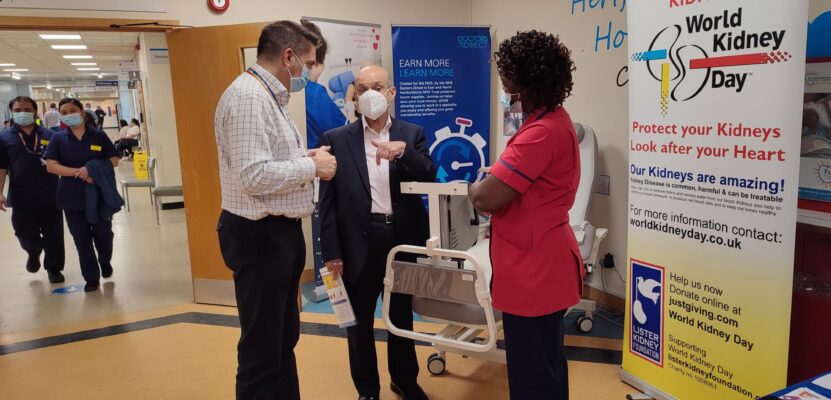
To mark World Kidney Day (Thursday 10 March) the Lister Area Kidney Patients Association (LAKPA) and the East and North Hertfordshire NHS Trust renal services team has set up an information stand at Lister hospital to help raise awareness of good kidney health and to share information about organ donation and kidney transplantation.
Patients, volunteers and staff are sharing information and guidance on all aspects of looking after your kidneys. A specialist exercise chair and bike is also on display to demonstrate how patients can keep active and improve their fitness while they are having dialysis treatment. There is also a quiz and a win-the-teddy competition. LAKPA volunteers and staff from the renal team are also sharing leaflets and responding to questions about organ donation.
Chronic kidney disease currently affects up to 10% of the population worldwide and the most common cause is high blood pressure and diabetes.
Praveen Jeevaratnam, consultant nephrologist at East and North Hertfordshire NHS Trust said: “We are really pleased to once again support LAKPA on World Kidney Day. We want to encourage everyone to have a healthy diet and lifestyle to support good kidney health, both as a preventative measure and for people living with chronic kidney disease. Simple long term health measures such as dietary changes and exercise, can lead to long term health benefits and prevent chronic medical issues and improve wellbeing.”
In partnership with the Herts and West Essex Integrated Care System and Digital First Primary Care the Trust has started a virtual Community Kidney Service which helps identify patients that may have chronic kidney disease earlier, leading to quicker diagnosis and treatment.
LAKPA Chair Kirit Modi said: “I am delighted that we are able to raise awareness about kidney health through a face to face event on World Kidney Day after two years, with the support of staff from the Trust. Early identification of kidney disease is very important so that action can be taken to reduce the number of people who may need a transplant or dialysis. I encourage anyone concerned about their kidneys to get a test done through their GP without delay.”
The Trust’s renal services include dialysis units at five sites, a home therapy unit as well as
specialist nursing, dietician and counselling teams. The kidney transplant team work closely with the transplant centres at Addenbrookes Hospital, Cambridge and London’s Royal Free and Hammersmith hospitals.
Becky’s story
Just before her 20th birthday Becky Gill from Harlow was hospitalised with extreme pain in her lower back and was diagnosed with pelvic ureteric junction (PUJ) obstruction and an enlarged kidney. Becky underwent several complex surgeries and had to take a break from her degree course. Three years on she is waiting to find out if she will need further surgery.
“I was a normal healthy teenager and suddenly everything changed overnight. Good kidney health is incredibly important and my advice is to drink lots of water, watch your diet and most importantly live your life to the fullest!”
Tushar’s story
Serious complications triggered by flu resulted in Tushar, a patient in his 40s requiring a SynCardia Total Artificial Heart. Subsequently Tushar became unwell with an infection that caused kidney failure and he needed dialysis. Following a trial, with specialists from Harefield Hospital and the Lister Hospital renal team working together Tushar became the first person in the UK with an artificial heart to be treated with dialysis.
“I’m delighted to now be training with the home therapies team so I can self-dialyse at home. I’ve worked so hard on my recovery and am determined to do everything I can to protect my kidney health. Since I was discharged from hospital it’s been wonderful to get back to the everyday things I enjoy such as walking my children to school.”
David’s story
Diagnosed with polycystic kidney disease in his late twenties, David from Welwyn Garden City, started dialysis in his sixties and then had a kidney transplant. Over the years David has exercised regularly with Pilates and daily walking as well as monitoring and adapting his diet.
“My father had kidney disease and I saw the impact it had on him over the years.” said David. “I certainly noticed I lost a lot of muscle mass from my short time on dialysis so after my transplant I eased back into walking, gently increasing my speed and distance. I’m now 67 and aim to walk every day as well as continuing with Pilates twice a week.”
Further information about kidney health can be found on the World Kidney Day website and to register your organ decision go to www.organdonation.nhs.uk